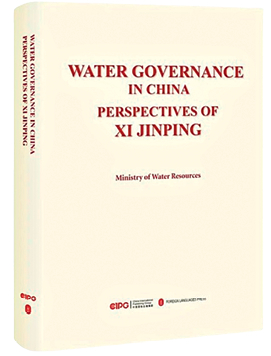
Water Governance in China – Perspectives of Xi Jinping
Author: Ministry of Water Resources
Hardcover, 512 pages
Published by Foreign Languages Press
Water has a vital symbolic significance in Chinese culture. Over 2,000 years ago, Lao Zi, the philosopher and founder of Taoism in the late Spring and Autumn Period (770-476 BC), noted, “The greatest virtue is like water, nurturing all living things without competing with them,” conveying the idea that true virtue, like flowing water, benefits all.
Across the world, water is seen as the mother of all life, the basis of survival of all living organisms, and the ultimate source of human civilization. Developing water conservancy and mitigating water-related disasters have always been priorities of state governance throughout the history of China.
In May, Water Governance in China — Perspectives of Xi Jinping was released at the 4th High-level Seminar on Global Water Security in Bali, Indonesia. The book elaborates on the background, significance, implications and essence of Chinese President Xi’s discourses on the management of water resources.
The 11 chapters throw light on the Communist Party of China (CPC)’s water governance, new challenges, principles, priorities, and the way of balancing the population and economy with resources and the environment. The book also illustrates with examples the country’s integrated conservation governance, coordinated efforts to prevent flood and drought disasters, the development of a national water network, and the national river strategy.
The book conveys Xi’s thinking on water governance with a roadmap for sustainable water governance in the new era. An innovative philosophy on water governance has been put forward, with the focus on “prioritizing water conservation, balancing spatial distribution, adopting systematic approaches, and leveraging the roles of both government and market.”
Guided by these principles, China has made significant improvements in water governance. With only six percent of the world’s freshwater resources, China has successfully ensured food and water security for nearly 20 percent of the world’s population.
However, due to the combined impacts of climate change and intensified human activity, the world is facing widespread water security challenges, such as frequent flood, water scarcity, damage to water ecology, and pollution of the water environment.
Among all countries, China faces some of the most complex water conditions, the greatest challenges in river management, and the most demanding responsibilities in water governance.
Since the 18th CPC National Congress in 2012, Xi has made numerous statements on water governance from the strategic perspective of the overall development of the country and Party, and sustainable progress. These statements embody the water governance theory and the distillation of China’s experience and serve as guiding principles for China’s endeavor to achieve high-quality development in water conservancy in the new era.
A prime example of China’s water conservancy efforts is the initiative focused on revitalizing the country’s “mother rivers,” which has resulted in significant improvements to rivers and lakes throughout the country. The main course of the Yellow River has been freed from disruption for 23 consecutive years, showcasing the success of this endeavor. On April 28, 2022, the entire length of the Beijing-Hangzhou Grand Canal opened for navigation for the first time in a century. With the revival of numerous rivers, the cities and regions along them are regaining vitality, while the inhabitants get a stronger sense of gain, fulfillment and security.
Many countries and international organizations are keen to gain a deeper understanding of China’s latest water governance philosophy and practical experience and explore how these insights can contribute to addressing global water challenges and promoting reform of the global water governance system.
The book also touches on some grand projects of water conservancy. Looking back in history, the renowned Dujiangyan flood control and irrigation system was constructed on the Chengdu Plain in Sichuan Province during the Warring States Period (475-221 BC). This transformative project turned the plain into a bountiful region known as the “heavenly land of abundance,” shielding its people from the perils of flood, drought, hunger, and famine.
Today, the South-to-North Water Diversion Project, which transfers water from the Yangtze River to northern China at substantial infrastructure investment, has yielded significant benefits. And the Three Gorges Dam, the world’s largest hydropower project, also plays a crucial role in controlling the frequent flooding in southern China.
The book concludes that the Chinese, living alongside water, surviving against it, and co-existing in harmony with it, have managed to understand, utilize, and even transform nature, forming a Chinese water culture and nurturing the Chinese civilization, the only civilization in the world that has continued uninterrupted to this day. The Chinese nation has flourished alongside the ebb and flow of its great rivers, nurturing a resilient and tenatious national spirit. Woven into the rich fabric of China’s over 5,000-year-old civilization, the vibrant narrative of water culture is a distinct and illustrious chapter in the chronicles of humanity.